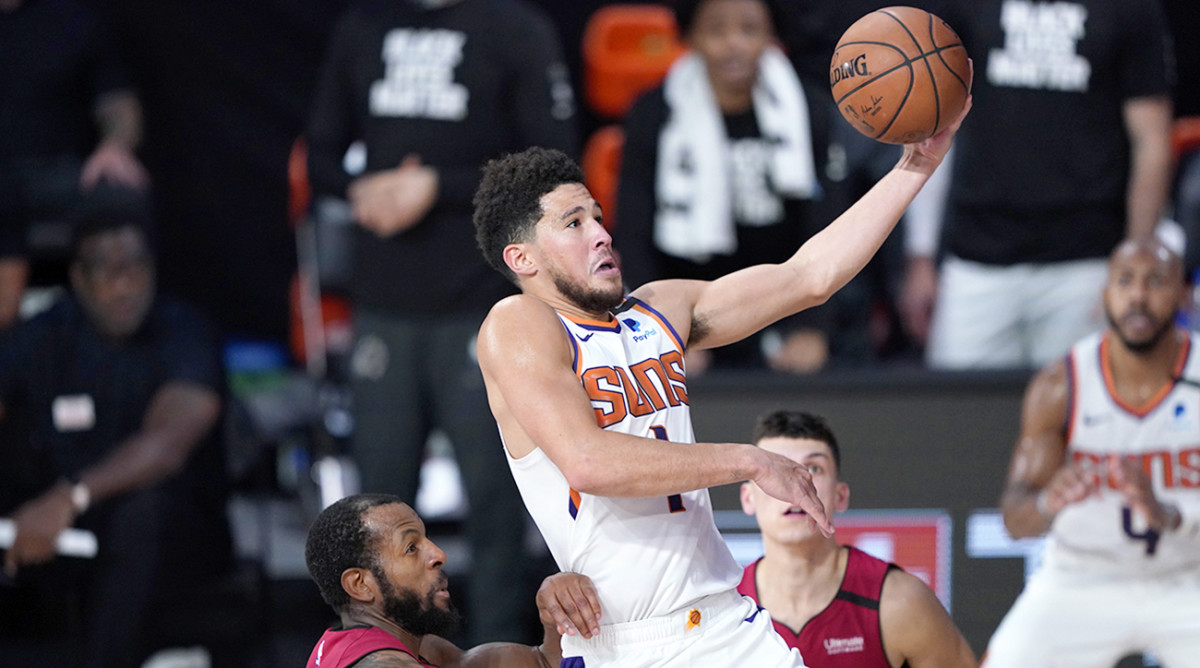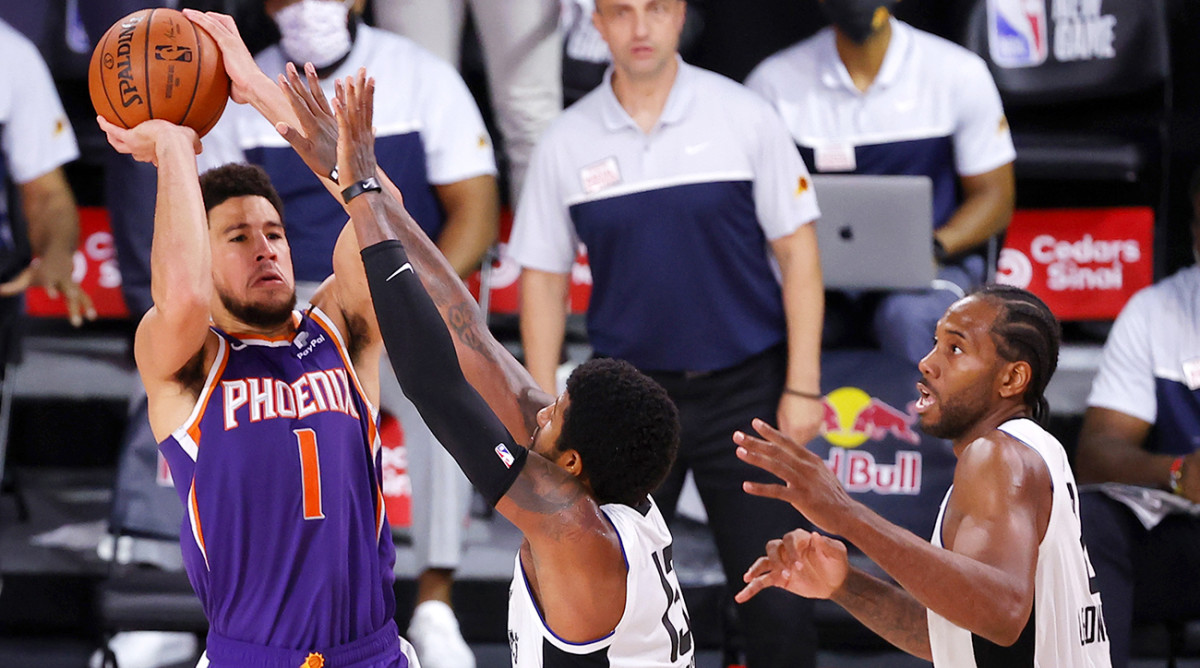‘That Dude Is Different’: Devin Booker Has Put the NBA on Notice
LAKE BUENA VISTA, Fla. – The texts live on Devin Booker’s phone, dozens of them, stored like a digital memorial. Kobe Bryant was more than just a brief peer. He was a confidant and advisor, a mentor and a friend. Every so often, Booker will pull up Bryant’s number and scroll through, reading the encouragement (Book ‘em! Bryant wrote after Booker dropped 70 on Boston in 2017), advice and endless string of emojis.
“Kobe,” Booker said, “loved emojis.”
Bryant believed in Booker. The NBA is catching up. The Suns are the talk of Central Florida, running their restart record to 5-0 after beating Miami on Saturday night, inching, improbably, closer to the No. 9 seed and a chance to compete for the Western Conference’s final playoff spot. Booker has been the catalyst. He has scored 30-plus in three of Phoenix’s five games. He dropped in 35, including the game-winner, in the Suns' win over the Clippers. He added another 35 against the Heat.
“I’ve been a fan of his since he was in college,” said Miami coach Erik Spoelstra. “His game has really grown.”

You know Booker by the scoring numbers, but is that all you know? Do you know the playmaking, the six-plus assists Booker has averaged the last two seasons? Do you know the defense, steadily improving, the insistence by Booker that he get the opposing team's toughest matchup every night? Do you know the work ethic on display since college, the all-around talent teams were stunned to see when this baby faced teenager declared for the draft after just one season at Kentucky?
In 2015, Miami brought Booker in for a pre-draft workout. Booker was brilliant, dominating assistant coach Chris Quinn, then just two years removed from a six-year playing career. After the workout, Spoelstra, Heat president Pat Riley and several team staffers took Booker to lunch. They had questions for Booker. He had more for them. “He wanted to know about the makeup of our team,” Spoelstra told SI. “He wanted to know the work ethic of our guys. He was really impressive.”
Ryan McDonough has a similar story. The ex-Suns GM watched Booker at Kentucky, but on a loaded ‘Cats team, there was only so many opportunities. Weeks before the draft, Phoenix brought Booker in as part of a group workout. Booker, says McDonough, was great. “He was so much more than just a catch-and-shoot player,” McDonough said in a telephone interview. “He could do it all.”
Competitive, too. At the end of the workout, the Suns gathered the players for a one-on-one knockout drill. You score, you stay on. You miss, you come off. Booker, McDonough recalls, scored 10 times in a row. Eventually, an assistant coach stepped in to stop the workout. Booker waved him off. “He said, ‘I’m not done until someone stops me,’” McDonough said. “Eventually someone did. But that competitiveness in him really stood out.”
That workout stuck with McDonough on draft night. The Suns had Booker ranked high, in a mix of wing players that included Stanley Johnson and Justise Winslow. Johnson came off the board at No. 8, to Detroit. Winslow went two picks later. Phoenix, sitting at 13, had Booker in its sights. When Utah, at No. 12, went on the clock, McDonough was confident he had his man.
Then, McDonough’s phone rang. It was Sam Presti, the Oklahoma City GM.
The Thunder, with the 14th pick, wanted to know if Phoenix would swap.
McDonough told Presti he needed to see who Utah picked.
When the Jazz selected Trey Lyles, McDonough told Presti the Suns were keeping the pick.
Presti, according to McDonough, asked who Phoenix was taking.
McDonough told him Booker. “And you could kind of hear or sense the air come out of the [OKC] room,” McDonough said. “You could tell they wanted him.”
Sealed the deal!@ConnsHomePlus #MakeItHappen Play of the Game pic.twitter.com/7JoXtapCDJ
— Phoenix Suns (@Suns) August 9, 2020
Booker was everything the Suns asked for, a tireless worker. He cracked the rotation midseason and, says McDonough, “we knew he was there to stay.” Booker’s father, Melvin, was a standout star at Missouri and had a cup of coffee in the NBA. In 2008, after nearly a decade spent playing overseas, he moved back to Moss Point, a small coastal town in Southern Mississippi. Booker, then living with his mother in Michigan, went to live with him. Dad became coach, with Melvin leading his son through early morning workouts on the gravely beaches, cone drills, ladder drills, sprints, pushing Booker’s limits.
“Very intense,” Booker told SI. “We would go a couple of days without talking after some workouts. But I learned the most about becoming a man and how to approach and take this game seriously.”
Booker brought that work ethic to Phoenix. He arrived early and stayed late, hoisting thousands of shots. Robert Sarver, the Suns owner, had a court at his house, and it wasn’t unusual for Booker to pop over after practice to shoot some more.
The work paid off, with Booker quickly becoming a statistical star. Questions, though, lingered. The Suns struggled in Booker’s first four years, never winning more than 24 games. They cycled through coaches, four in all. Booker’s numbers, some reasoned, amounted to empty calories. He was a good player. He just wasn’t a winning player.
McDonough heard it. He knew Booker did, too.
“Not being a winner, hearing that, that was what bothered me most,” Booker said. “Winning is my main objective when I go out there every day. It's not about the numbers that I put up. As cliché as it sounds, I know everybody says it, but my main objective is to win and make the right play every time down court.”
Booker needed help, and the cavalry arrived last summer. There was Monty Williams, an unabashed Booker fan. Williams remembered watching Booker in 2016, when Booker was playing for USA Basketball’s select team. “He had no fear,” Williams said. “He was making a statement.” Last year, Philadelphia, with Williams on the bench, played in Phoenix. Late in the game, with the Sixers clinging to a seven-point lead, Philadelphia went zone. Booker busted it by knocking down a 27-footer.
Said Williams, “I was like, that dude is different.”
There was Ricky Rubio, the playmaking point guard Phoenix lavished a three-year, $51 million deal on last July. Rubio was everything Booker needed, a pass-first point guard eager to set him up, a sturdy defender who could handle tough assignments. Booker, says Rubio, is a “unique talent” whose footwork reminds him of Bryant. “I don’t think he gets enough credit for who he is and what he does,” Rubio said. “Hopefully he’ll get more respect … he is a winner.”
A winner. From Michigan to Mississippi, Kentucky to Phoenix, that’s all Booker has wanted. The Suns, regardless of what happens the rest of this season, are well positioned for the next one. “Get my man out of Phoenix,” is what Draymond Green said on TNT on Friday, but these aren’t the same old Suns. Booker and Rubio are locked into long term deals. Kelly Oubre is signed through next season. Ayton, Mikal Bridges and Cam Johnson are on rookie contracts. James Jones has seized control of the front office and Williams has brought stability to the bench.

“Since I’ve been in Phoenix, we haven’t had [team] success,” Booker said. “We owe it to the fans, we owe it to the organization. It’s been a long time for us. This bubble opportunity was big for us, and we’re taking advantage of it.”
Indeed. As Bryant would. There are similarities to Booker and Bryant, teen phenoms who made a quick impact, late lottery picks with something to prove. Before Bryant won he couldn’t win, not without Shaquille O’Neal, not without another accomplished star. Post-Shaq, pre-Pau Gasol, Bryant was the gunner, Bryant was the stat stuffer, Bryant was putting up gaudy numbers on a team going nowhere.
On Booker’s right forearm, a tattoo reads Be Legendary. It’s what Bryant wrote on a pair of sneakers he gave to Booker in 2016. Booker had it inked on weeks after Bryant was killed in a helicopter crash in January. It was his first tattoo. It will be his last. He is reminded of Bryant when he looks at his arm. He thinks of him when he scrolls through his phone. The last text he sent Bryant came the day of the crash, when word spread that Bryant was on the Southern California chopper.
He asked if Bryant was OK.
The message never went through.
“The most impactful moment in my life,” Booker said. “But Kobe is with me every day. The Mamba Mentality, the approach, the don't want to lose at all costs, the competitiveness, the whatever it takes attitude. Having that goal and then knowing the steps to get to it and not short cutting any of those. Every day is a grind. Every day is a new opportunity to get better.”
